Sacred Texts Islam Lesson 1
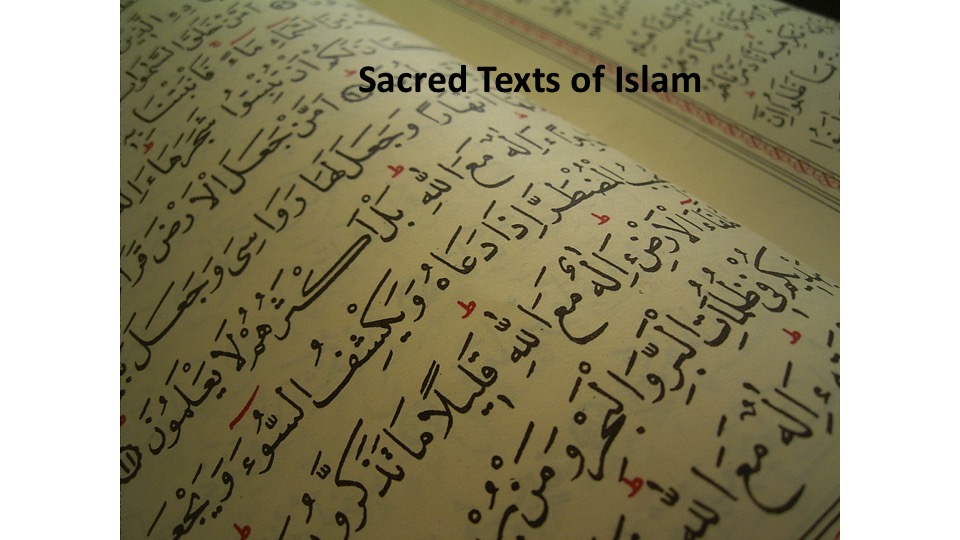
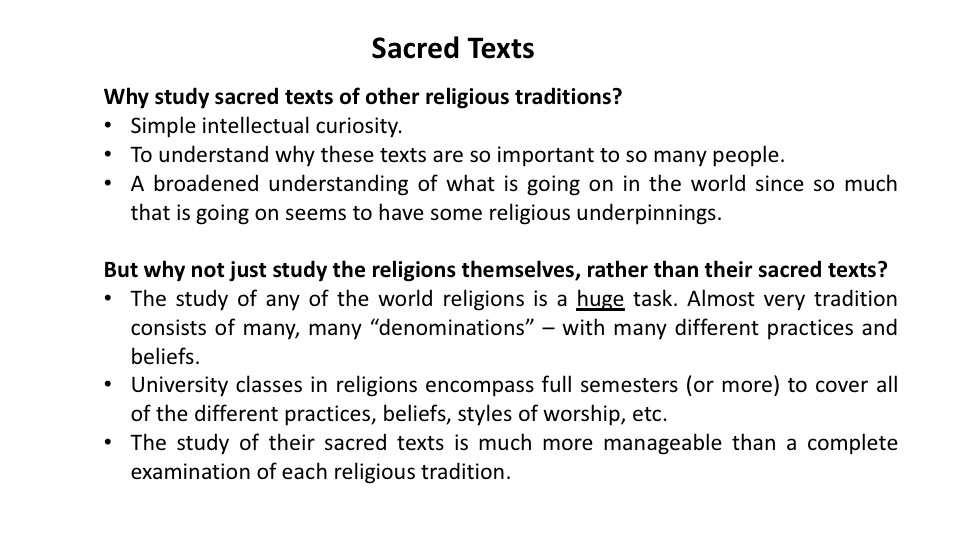
Sacred Texts
Why study sacred texts of other religious traditions?
•Simple intellectual curiosity.
•To understand why these texts are so important to so many people.
•A broadened understanding of what is going on in the world since so much that is going on seems to have some religious underpinnings.
But why not just study the religions themselves, rather than their sacred texts?
•The study of any of the world religions is a huge task. Almost very tradition consists of many, many “denominations” – with many different practices and beliefs.
•University classes in religions encompass full semesters (or more) to cover all of the different practices, beliefs, styles of worship, etc.
•The study of their sacred texts is much more manageable than a complete examination of each religious tradition.
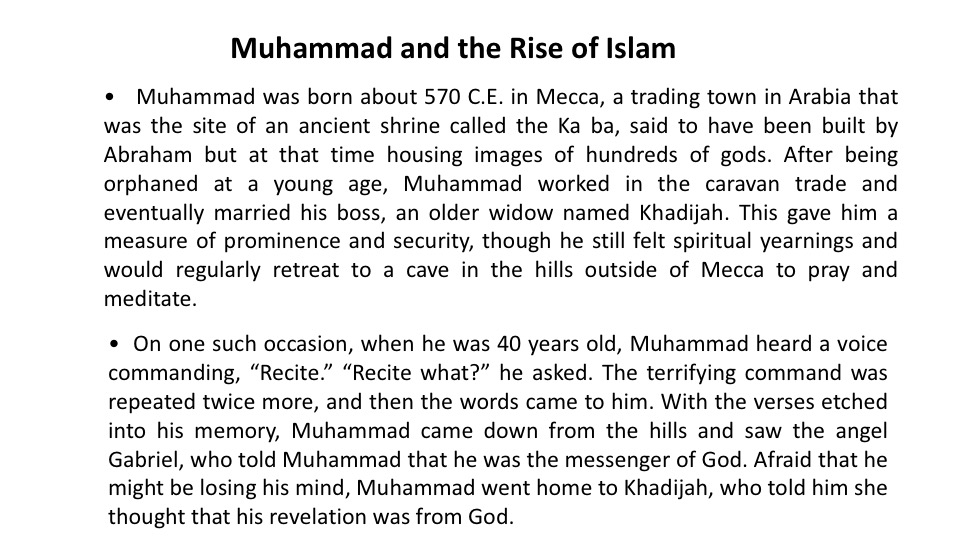
Muhammad and the Rise of Islam
Muhammad was born about 570 C.E. in Mecca, a trading town in Arabia that was the site of an ancient shrine called the Ka ba, said to have been built by Abraham but at that time housing images of hundreds of gods. After being orphaned at a young age, Muhammad worked in the caravan trade and eventually married his boss, an older widow named Khadijah. This gave him a measure of prominence and security, though he still felt spiritual yearnings and would regularly retreat to a cave in the hills outside of Mecca to pray and meditate.
On one such occasion, when he was 40 years old, Muhammad heard a voice commanding, “Recite.” “Recite what?” he asked. The terrifying command was repeated twice more, and then the words came to him. With the verses etched into his memory, Muhammad came down from the hills and saw the angel Gabriel, who told Muhammad that he was the messenger of God. Afraid that he might be losing his mind, Muhammad went home to Khadijah, who told him she thought that his revelation was from God.
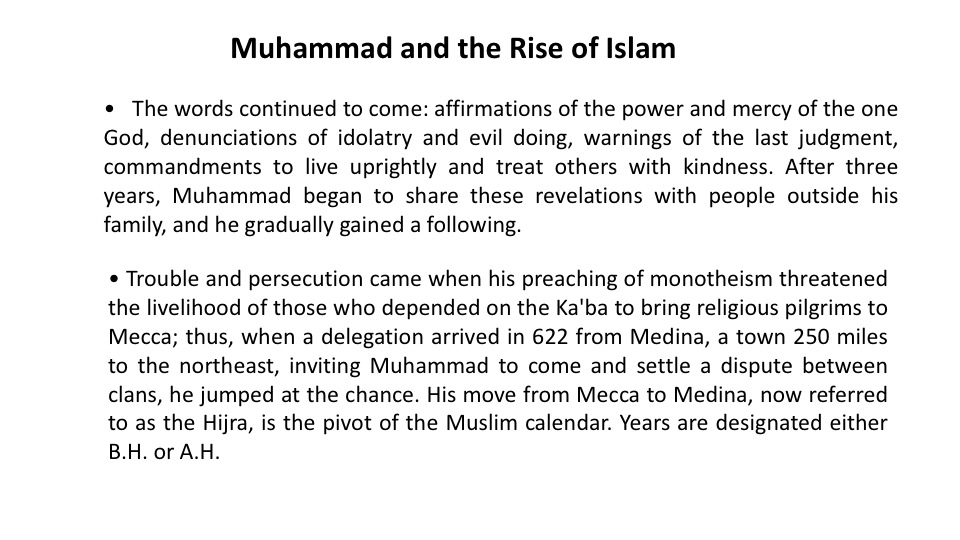
Muhammad and the Rise of Islam
The words continued to come: affirmations of the power and mercy of the one God, denunciations of idolatry and evil doing, warnings of the last judgment, commandments to live uprightly and treat others with kindness. After three years, Muhammad began to share these revelations with people outside his family, and he gradually gained a following.
Trouble and persecution came when his preaching of monotheism threatened the livelihood of those who depended on the Ka'ba to bring religious pilgrims to Mecca; thus, when a delegation arrived in 622 from Medina, a town 250 miles to the northeast, inviting Muhammad to come and settle a dispute between clans, he jumped at the chance. His move from Mecca to Medina, now referred to as the Hijra, is the pivot of the Muslim calendar. Years are designated either B.H. or A.H.
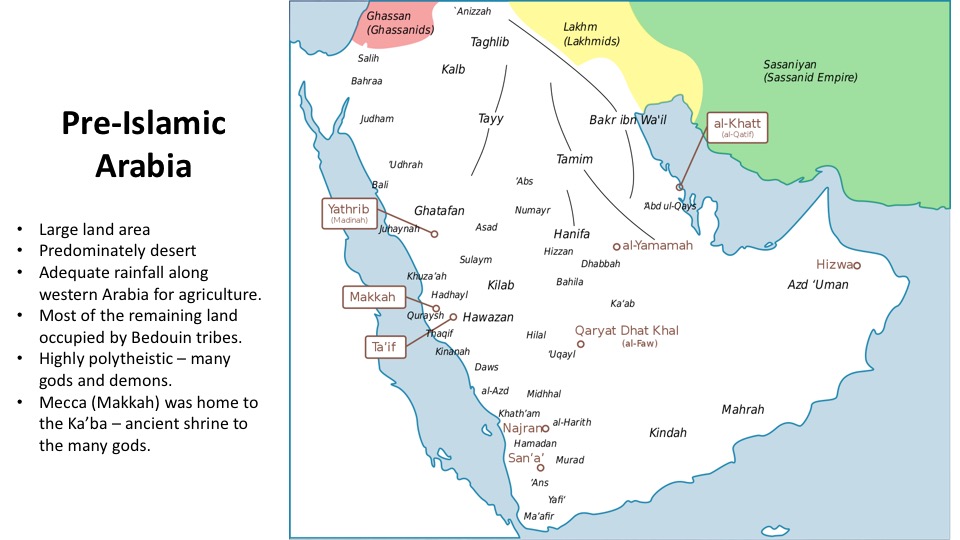
Pre-Islamic Arabia
•Large land area
•Predominately desert
•Adequate rainfall along western Arabia for agriculture.
•Most of the remaining land occupied by Bedouin tribes.
•Highly polytheistic – many gods and demons.
•Mecca (Makkah) was home to the Ka’ba – ancient shrine to the many gods.
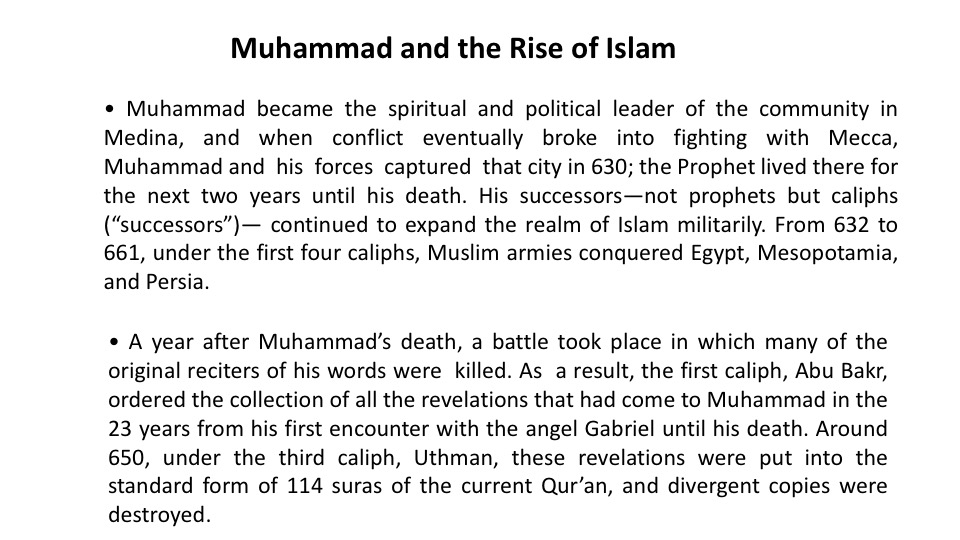
Muhammad and the Rise of Islam
Muhammad became the spiritual and political leader of the community in Medina, and when conflict eventually broke into fighting with Mecca, Muhammad and his forces captured that city in 630; the Prophet lived there for the next two years until his death. His successors—not prophets but caliphs (“successors”)— continued to expand the realm of Islam militarily. From 632 to 661, under the first four caliphs, Muslim armies conquered Egypt, Mesopotamia, and Persia.
A year after Muhammad’s death, a battle took place in which many of the original reciters of his words were killed. As a result, the first caliph, Abu Bakr, ordered the collection of all the revelations that had come to Muhammad in the 23 years from his first encounter with the angel Gabriel until his death. Around 650, under the third caliph, Uthman, these revelations were put into the standard form of 114 suras of the current Qur’an, and divergent copies were destroyed.
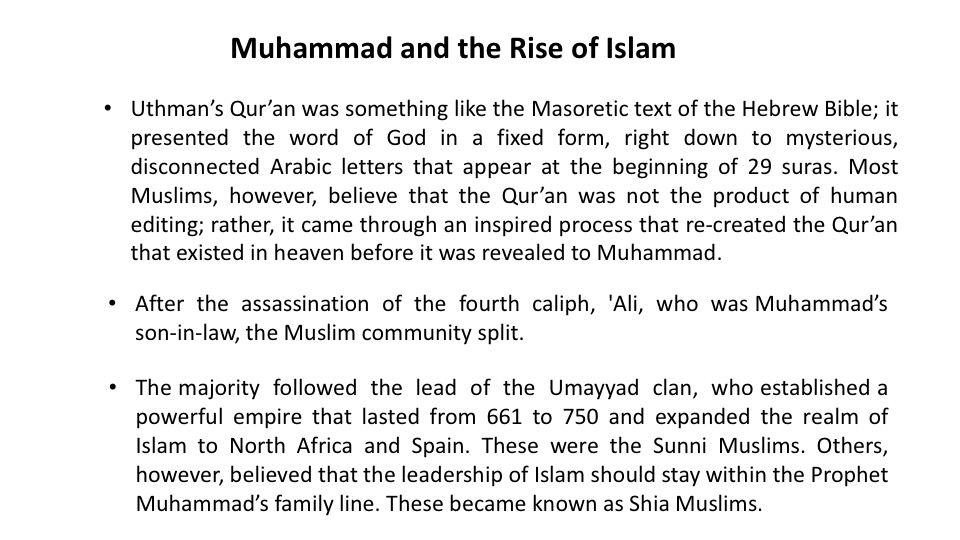
Muhammad and the Rise of Islam
Uthman’s Qur’an was something like the Masoretic text of the Hebrew Bible; it presented the word of God in a fixed form, right down to mysterious, disconnected Arabic letters that appear at the beginning of 29 suras. Most Muslims, however, believe that the Qur’an was not the product of human editing; rather, it came through an inspired process that re-created the Qur’an that existed in heaven before it was revealed to Muhammad.
After the assassination of the fourth caliph, 'Ali, who was Muhammad’s son-in-law, the Muslim community split.
The majority followed the lead of the Umayyad clan, who established a powerful empire that lasted from 661 to 750 and expanded the realm of Islam to North Africa and Spain. These were the Sunni Muslims. Others, however, believed that the leadership of Islam should stay within the Prophet Muhammad’s family line. These became known as Shia Muslims.
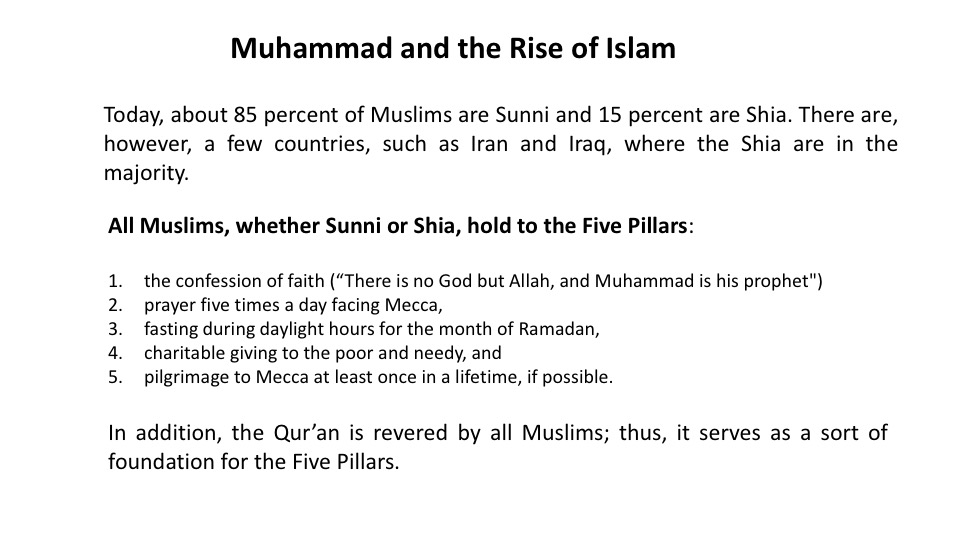
Muhammad and the Rise of Islam
Today, about 85 percent of Muslims are Sunni and 15 percent are Shia. There are, however, a few countries, such as Iran and Iraq, where the Shia are in the majority.
All Muslims, whether Sunni or Shia, hold to the Five Pillars:
1.the confession of faith (“There is no God but Allah, and Muhammad is his prophet")
2.prayer five times a day facing Mecca,
3.fasting during daylight hours for the month of Ramadan,
4.charitable giving to the poor and needy, and
5.pilgrimage to Mecca at least once in a lifetime, if possible.
In addition, the Qur’an is revered by all Muslims; thus, it serves as a sort of foundation for the Five Pillars.
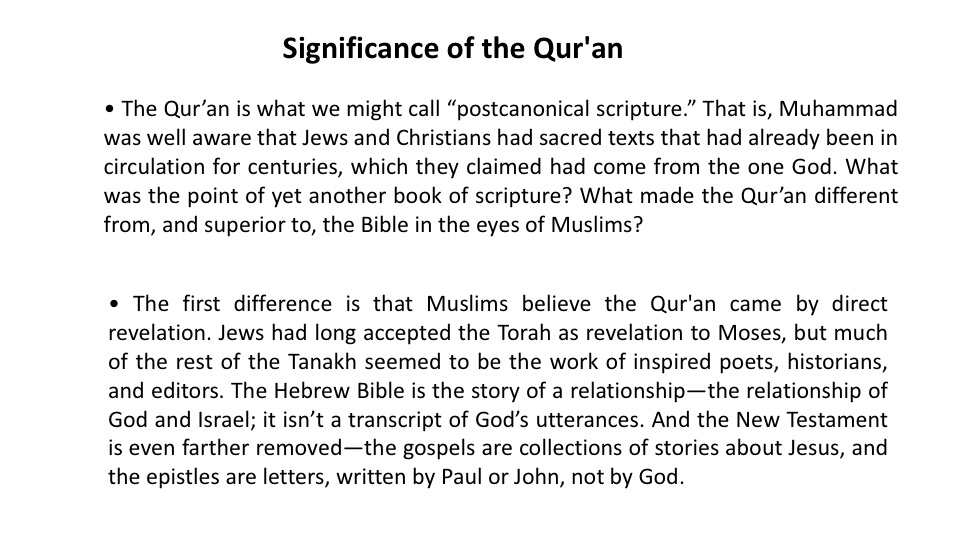
Significance of the Qur'an
The Qur’an is what we might call “postcanonical scripture.” That is, Muhammad was well aware that Jews and Christians had sacred texts that had already been in circulation for centuries, which they claimed had come from the one God. What was the point of yet another book of scripture? What made the Qur’an different from, and superior to, the Bible in the eyes of Muslims?
The first difference is that Muslims believe the Qur'an came by direct revelation. Jews had long accepted the Torah as revelation to Moses, but much of the rest of the Tanakh seemed to be the work of inspired poets, historians, and editors. The Hebrew Bible is the story of a relationship—the relationship of God and Israel; it isn’t a transcript of God’s utterances. And the New Testament is even farther removed—the gospels are collections of stories about Jesus, and the epistles are letters, written by Paul or John, not by God.
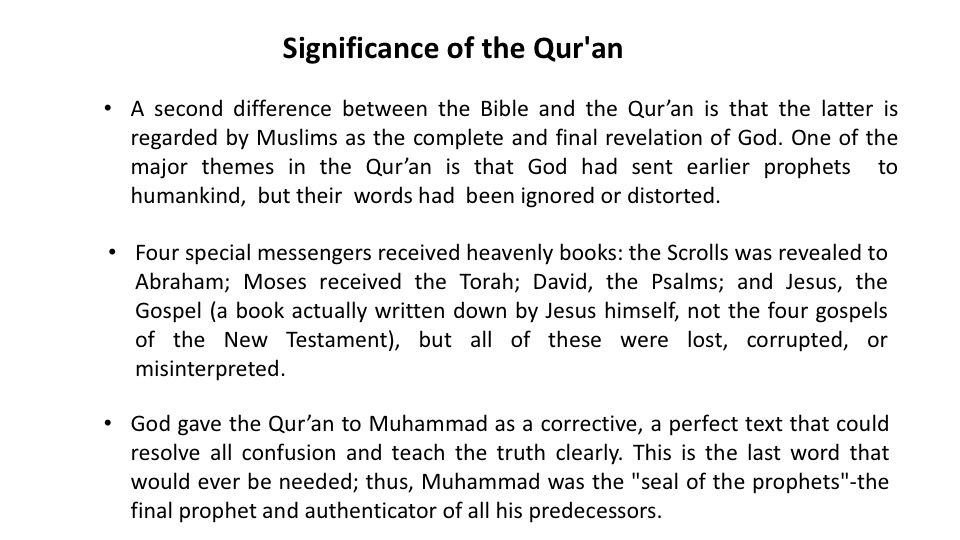
Significance of the Qur'an
A second difference between the Bible and the Qur’an is that the latter is regarded by Muslims as the complete and final revelation of God. One of the major themes in the Qur’an is that God had sent earlier prophets to humankind, but their words had been ignored or distorted.
Four special messengers received heavenly books: the Scrolls was revealed to Abraham; Moses received the Torah; David, the Psalms; and Jesus, the Gospel (a book actually written down by Jesus himself, not the four gospels of the New Testament), but all of these were lost, corrupted, or misinterpreted.
God gave the Qur’an to Muhammad as a corrective, a perfect text that could resolve all confusion and teach the truth clearly. This is the last word that would ever be needed; thus, Muhammad was the "seal of the prophets"-the final prophet and authenticator of all his predecessors.
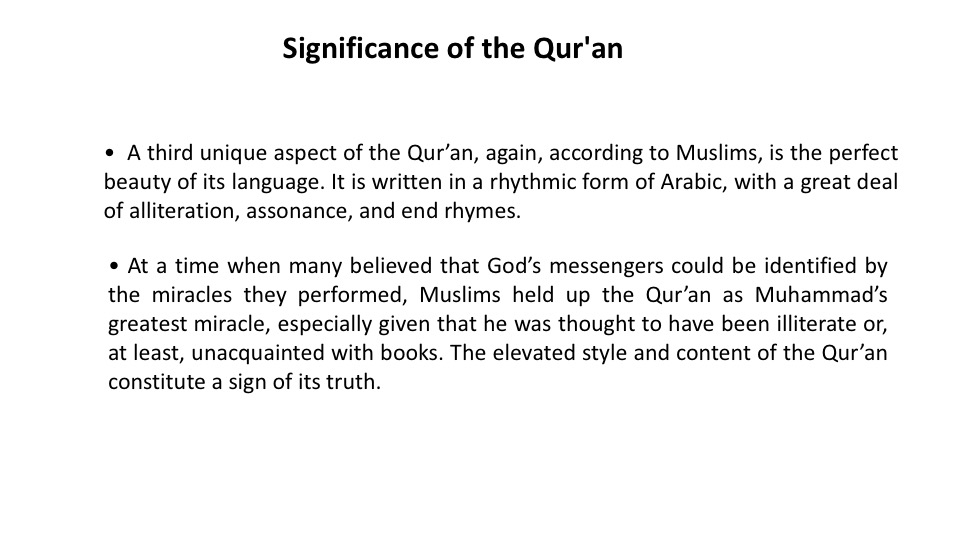
Significance of the Qur'an
A third unique aspect of the Qur’an, again, according to Muslims, is the perfect beauty of its language. It is written in a rhythmic form of Arabic, with a great deal of alliteration, assonance, and end rhymes.
At a time when many believed that God’s messengers could be identified by the miracles they performed, Muslims held up the Qur’an as Muhammad’s greatest miracle, especially given that he was thought to have been illiterate or, at least, unacquainted with books. The elevated style and content of the Qur’an constitute a sign of its truth.
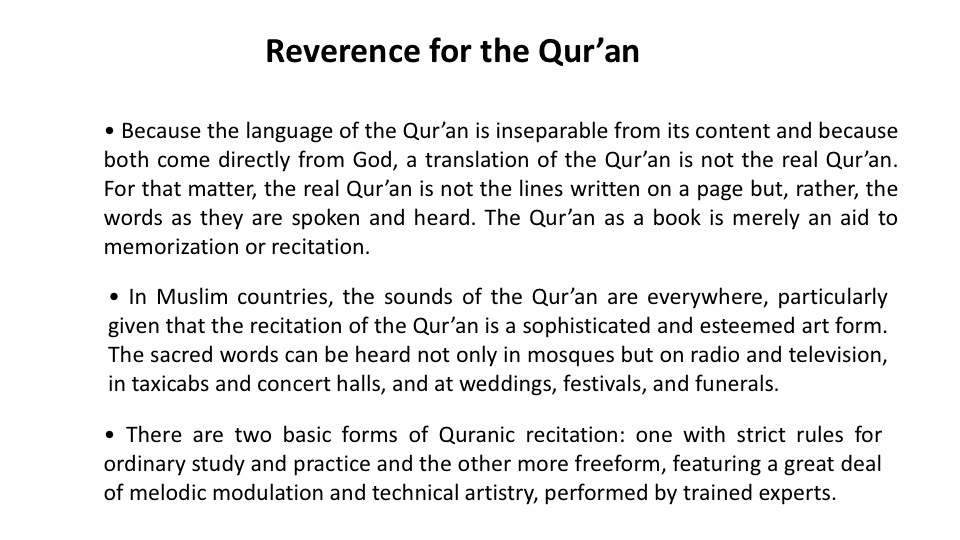
Reverence for the Qur'an
Because the language of the Qur’an is inseparable from its content and because both come directly from God, a translation of the Qur’an is not the real Qur’an. For that matter, the real Qur’an is not the lines written on a page but, rather, the words as they are spoken and heard. The Qur’an as a book is merely an aid to memorization or recitation.
In Muslim countries, the sounds of the Qur’an are everywhere, particularly given that the recitation of the Qur’an is a sophisticated and esteemed art form. The sacred words can be heard not only in mosques but on radio and television, in taxicabs and concert halls, and at weddings, festivals, and funerals.
There are two basic forms of Quranic recitation: one with strict rules for ordinary study and practice and the other more freeform, featuring a great deal of melodic modulation and technical artistry, performed by trained experts.
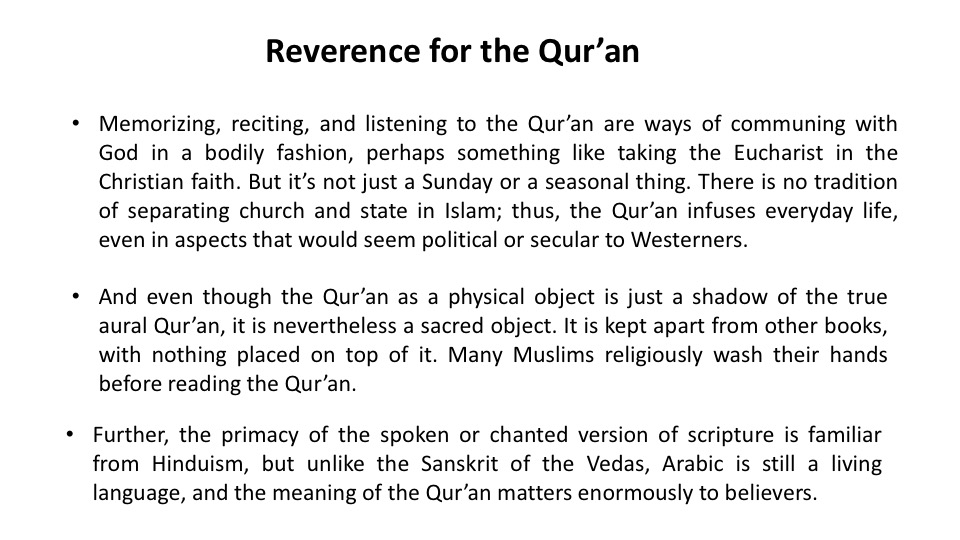
Reverence for the Qur'an
Memorizing, reciting, and listening to the Qur’an are ways of communing with God in a bodily fashion, perhaps something like taking the Eucharist in the Christian faith. But it’s not just a Sunday or a seasonal thing. There is no tradition of separating church and state in Islam; thus, the Qur’an infuses everyday life, even in aspects that would seem political or secular to Westerners.
And even though the Qur’an as a physical object is just a shadow of the true aural Qur’an, it is nevertheless a sacred object. It is kept apart from other books, with nothing placed on top of it. Many Muslims religiously wash their hands before reading the Qur’an.
Further, the primacy of the spoken or chanted version of scripture is familiar from Hinduism, but unlike the Sanskrit of the Vedas, Arabic is still a living language, and the meaning of the Qur’an matters enormously to believers.
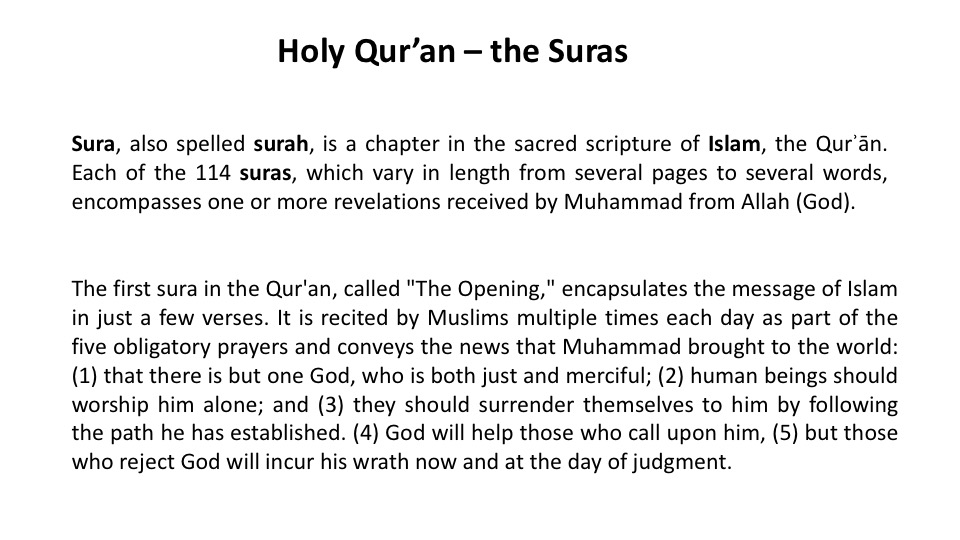
Holy Qur'an - the Suras
Sura, also spelled surah, is a chapter in the sacred scripture of Islam, the Qurʾān. Each of the 114 suras, which vary in length from several pages to several words, encompasses one or more revelations received by Muhammad from Allah (God).
The first sura in the Qur'an, called "The Opening," encapsulates the message of Islam in just a few verses. It is recited by Muslims multiple times each day as part of the five obligatory prayers and conveys the news that Muhammad brought to the world: (1) that there is but one God, who is both just and merciful; (2) human beings should worship him alone; and (3) they should surrender themselves to him by following the path he has established. (4) God will help those who call upon him, (5) but those who reject God will incur his wrath now and at the day of judgment.
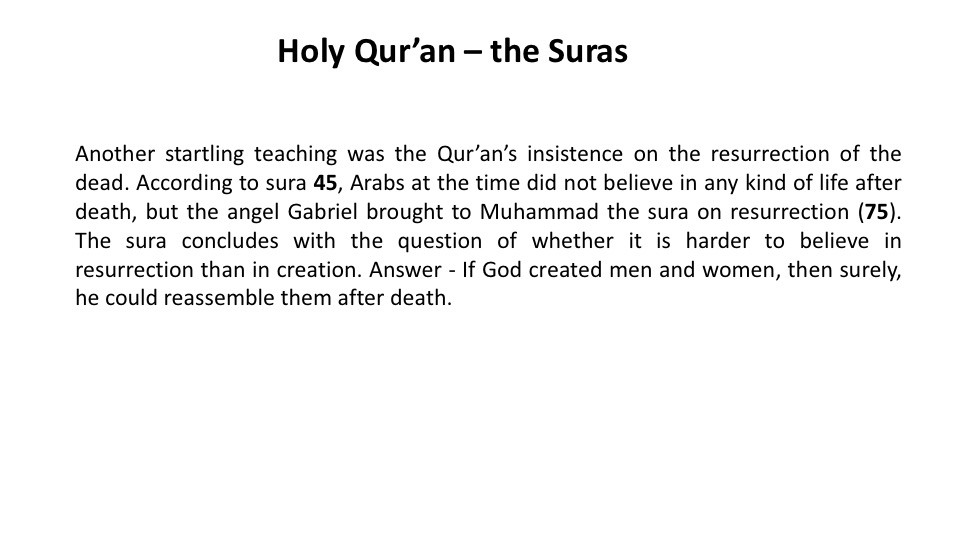
Holy Qur'an - the Suras
Another startling teaching was the Qur’an’s insistence on the resurrection of the dead. According to sura 45, Arabs at the time did not believe in any kind of life after death, but the angel Gabriel brought to Muhammad the sura on resurrection (75). The sura concludes with the question of whether it is harder to believe in resurrection than in creation. Answer - If God created men and women, then surely, he could reassemble them after death.
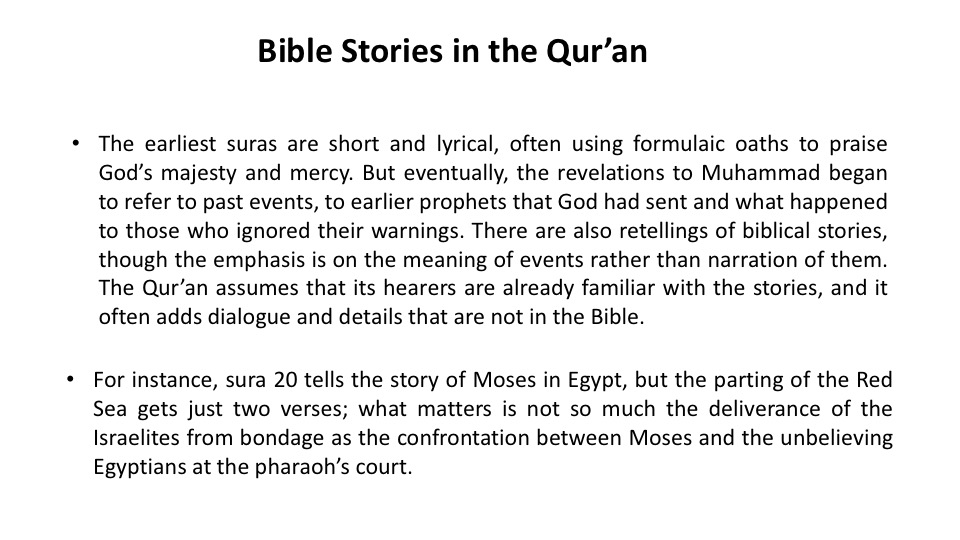
Bible Stories in the Qur'an
The earliest suras are
short and lyrical, often using formulaic oaths to praise God’s majesty and
mercy. But eventually, the revelations to Muhammad began to refer to past
events, to earlier prophets that God had sent and what happened to those who
ignored their warnings. There are also retellings of biblical stories, though
the emphasis is on the meaning of events rather than narration of them. The
Qur’an assumes that its hearers are already familiar with the stories, and it
often adds dialogue and details that are not in the Bible.
For instance, sura 20 tells the story of Moses in Egypt, but the parting of the Red Sea gets just two verses; what matters is not so much the deliverance of the Israelites from bondage as the confrontation between Moses and the unbelieving Egyptians at the pharaoh’s court.
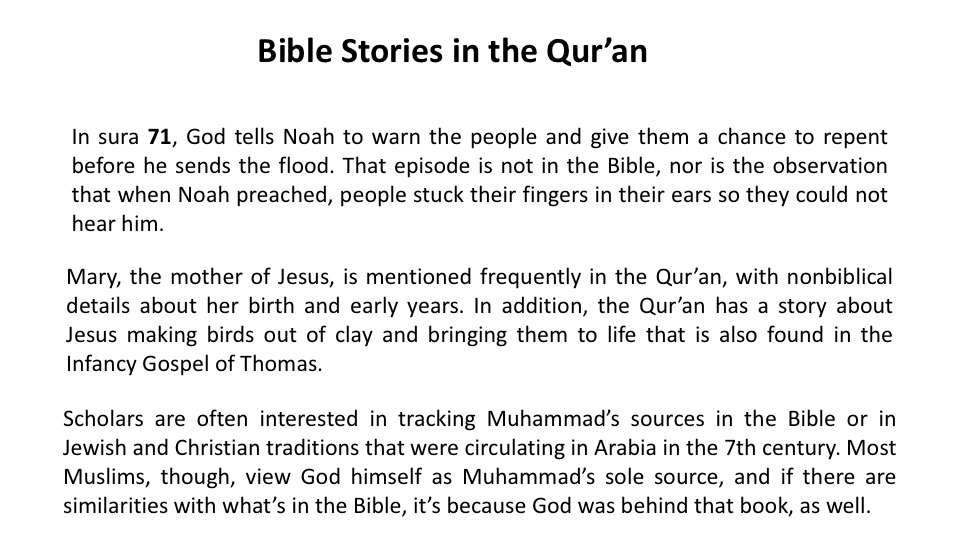
Bible Stories in the Qur'an
In sura 71, God tells Noah to warn the people and give them a chance to repent before he sends the flood. That episode is not in the Bible, nor is the observation that when Noah preached, people stuck their fingers in their ears so they could not hear him.
Mary, the mother of Jesus, is mentioned frequently in the Qur’an, with nonbiblical details about her birth and early years. In addition, the Qur’an has a story about Jesus making birds out of clay and bringing them to life that is also found in the Infancy Gospel of Thomas.
Scholars are often interested in tracking Muhammad’s sources in the Bible or in Jewish and Christian traditions that were circulating in Arabia in the 7th century. Most Muslims, though, view God himself as Muhammad’s sole source, and if there are similarities with what’s in the Bible, it’s because God was behind that book, as well.
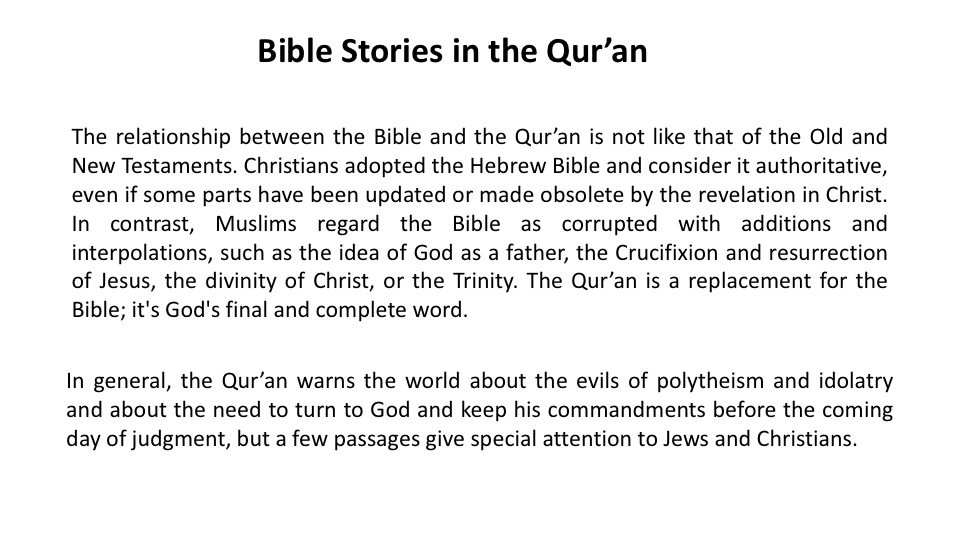
Bible Stories in the Qur'an
The relationship between the Bible and the Qur’an is not like that of the Old and New Testaments. Christians adopted the Hebrew Bible and consider it authoritative, even if some parts have been updated or made obsolete by the revelation in Christ. In contrast, Muslims regard the Bible as corrupted with additions and interpolations, such as the idea of God as a father, the Crucifixion and resurrection of Jesus, the divinity of Christ, or the Trinity. The Qur’an is a replacement for the Bible; it's God's final and complete word.
In general, the Qur’an warns the world about the evils of polytheism and idolatry and about the need to turn to God and keep his commandments before the coming day of judgment, but a few passages give special attention to Jews and Christians.
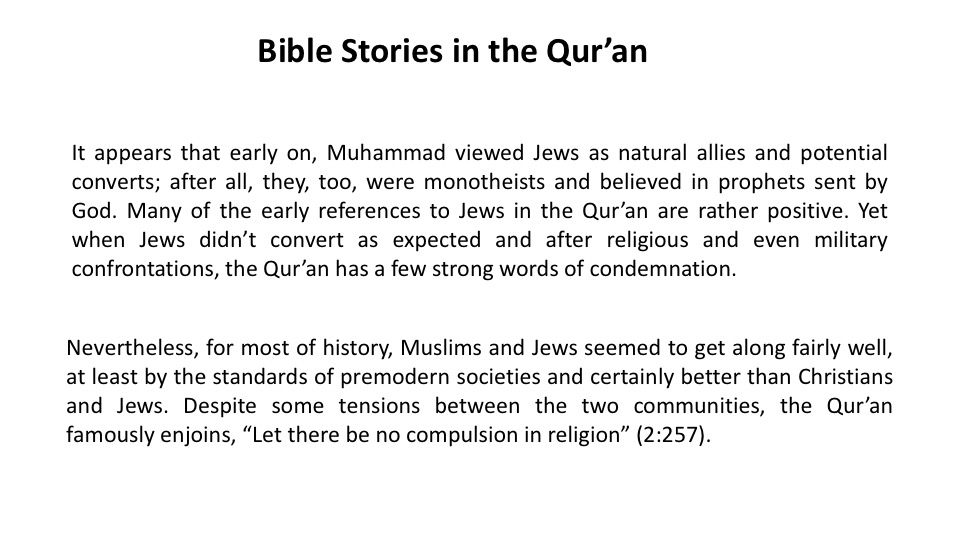
Bible Stories in the Qur'an
It appears that early on, Muhammad viewed Jews as natural allies and potential converts; after all, they, too, were monotheists and believed in prophets sent by God. Many of the early references to Jews in the Qur’an are rather positive. Yet when Jews didn’t convert as expected and after religious and even military confrontations, the Qur’an has a few strong words of condemnation.
Nevertheless, for most of history, Muslims and Jews seemed to get along fairly well, at least by the standards of premodern societies and certainly better than Christians and Jews. Despite some tensions between the two communities, the Qur’an famously enjoins, “Let there be no compulsion in religion” (2:257).
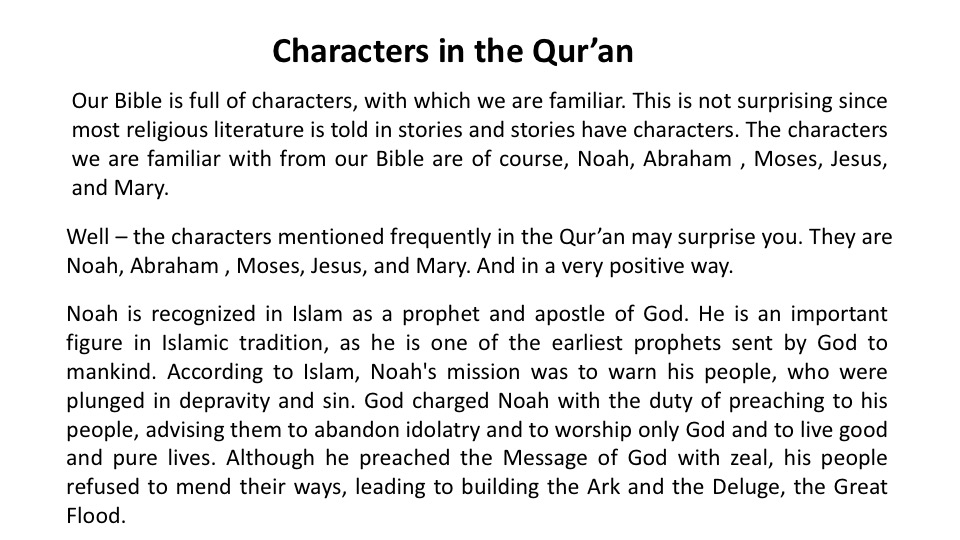
Characters in the Qur'an
Our Bible is full of characters, with which we are familiar. This is not surprising since most religious literature is told in stories and stories have characters. The characters we are familiar with from our Bible are of course, Noah, Abraham, Moses, Jesus, and Mary.
Well – the characters mentioned frequently in the Qur’an may surprise you. They are Noah, Abraham , Moses, Jesus, and Mary. And in a very positive way.
Noah is recognized in Islam as a prophet and apostle of God. He is an important figure in Islamic tradition, as he is one of the earliest prophets sent by God to mankind. According to Islam, Noah's mission was to warn his people, who were plunged in depravity and sin. God charged Noah with the duty of preaching to his people, advising them to abandon idolatry and to worship only God and to live good and pure lives. Although he preached the Message of God with zeal, his people refused to mend their ways, leading to building the Ark and the Deluge, the Great Flood.
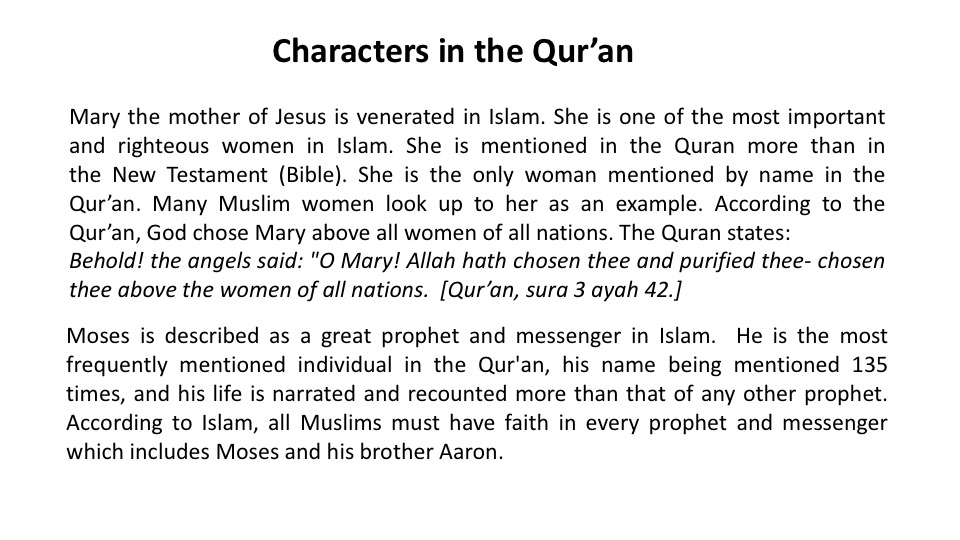
Characters in the Qur'an
Mary the mother of Jesus is venerated in Islam. She is one of the most important and righteous women in Islam. She is mentioned in the Quran more than in the New Testament (Bible). She is the only woman mentioned by name in the Qur’an. Many Muslim women look up to her as an example. According to the Qur’an, God chose Mary above all women of all nations. The Quran states:
Behold! the angels said: "O Mary! Allah hath chosen thee and purified thee- chosen thee above the women of all nations. [Qur’an, sura 3 ayah 42.]
Moses is described as a great prophet and messenger in Islam. He is the most frequently mentioned individual in the Qur'an, his name being mentioned 135 times, and his life is narrated and recounted more than that of any other prophet. According to Islam, all Muslims must have faith in every prophet and messenger which includes Moses and his brother Aaron.
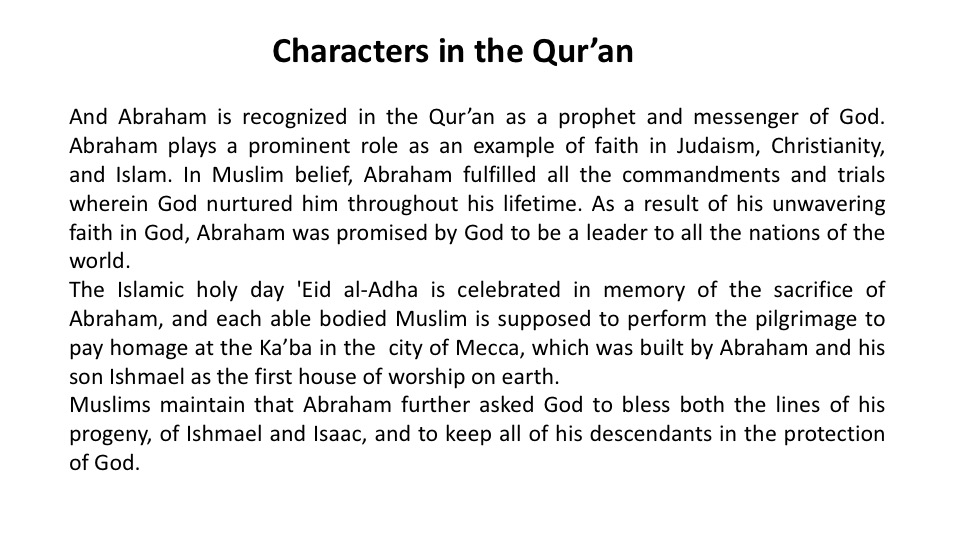
Characters in the Qur'an
And Abraham is recognized in the Qur’an as a prophet and messenger of God. Abraham plays a prominent role as an example of faith in Judaism, Christianity, and Islam. In Muslim belief, Abraham fulfilled all the commandments and trials wherein God nurtured him throughout his lifetime. As a result of his unwavering faith in God, Abraham was promised by God to be a leader to all the nations of the world.
The Islamic holy day 'Eid al-Adha is celebrated in memory of the sacrifice of Abraham, and each able bodied Muslim is supposed to perform the pilgrimage to pay homage at the Ka’ba in the city of Mecca, which was built by Abraham and his son Ishmael as the first house of worship on earth.
Muslims maintain that Abraham further asked God to bless both the lines of his progeny, of Ishmael and Isaac, and to keep all of his descendants in the protection of God.
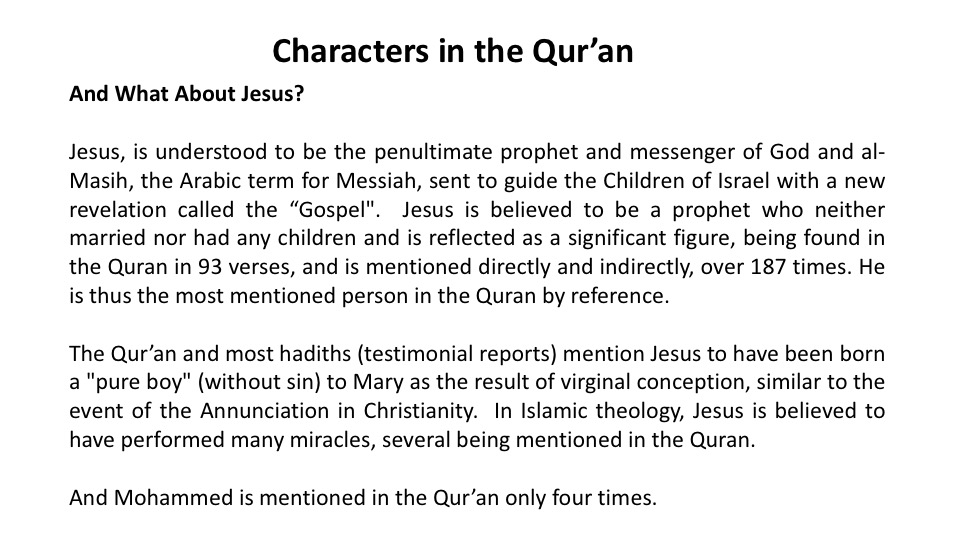
Characters in the Qur'an
And What About Jesus?
Jesus, is understood to be the penultimate prophet and messenger of God and al-Masih, the Arabic term for Messiah, sent to guide the Children of Israel with a new revelation called the “Gospel". Jesus is believed to be a prophet who neither married nor had any children and is reflected as a significant figure, being found in the Quran in 93 verses, and is mentioned directly and indirectly, over 187 times. He is thus the most mentioned person in the Quran by reference.
The Qur’an and most hadiths (testimonial reports) mention Jesus to have been born a "pure boy" (without sin) to Mary as the result of virginal conception, similar to the event of the Annunciation in Christianity. In Islamic theology, Jesus is believed to have performed many miracles, several being mentioned in the Quran.
And Mohammed is mentioned in the Qur’an only four times.
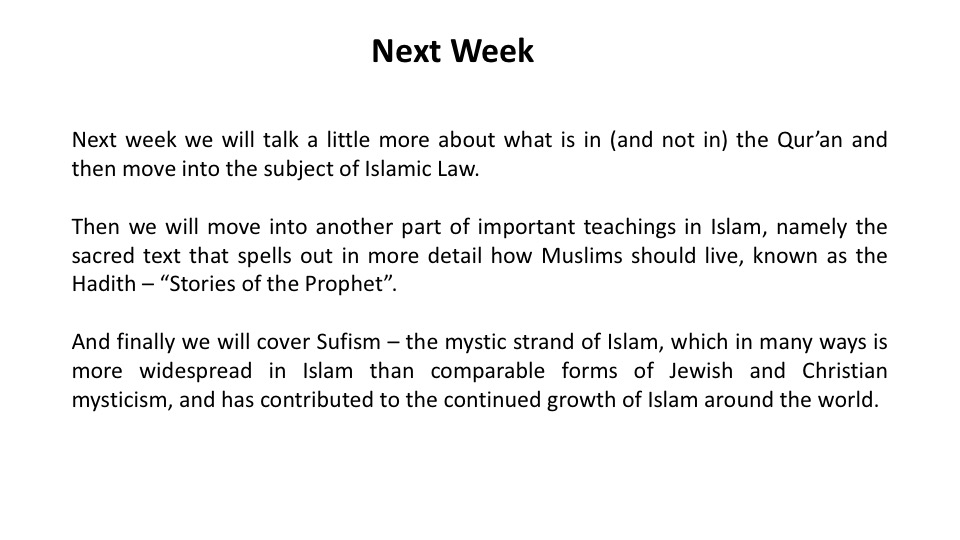
Next Week
Next week we will talk a little more about what is in (and not in) the Qur’an and then move into the subject of Islamic Law.
Then we will move into another part of important teachings in Islam, namely the sacred text that spells out in more detail how Muslims should live, known as the Hadith – “Stories of the Prophet”.
And finally we will cover Sufism – the mystic strand of Islam, which in many ways is more widespread in Islam than comparable forms of Jewish and Christian mysticism, and has contributed to the continued growth of Islam around the world.